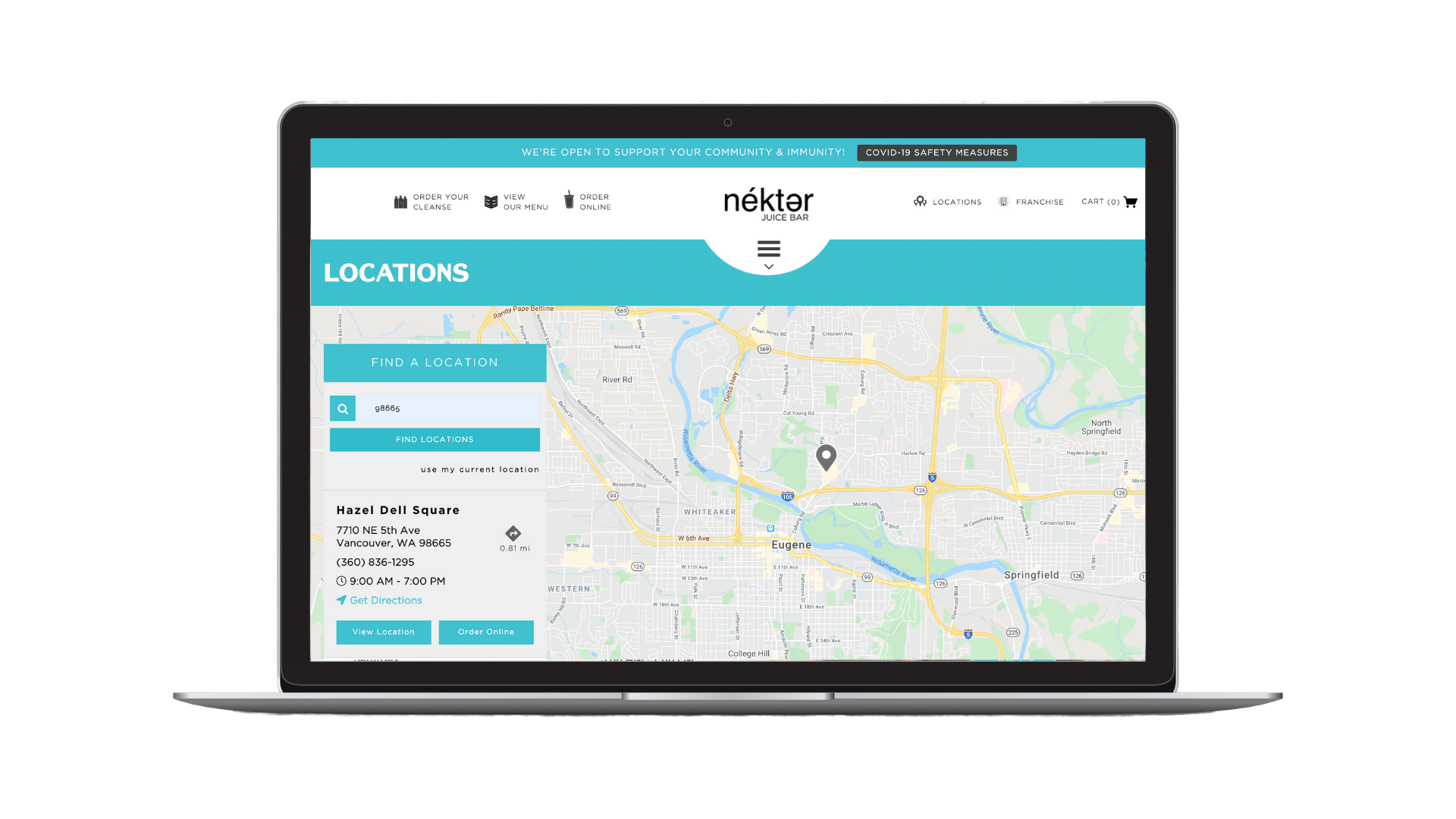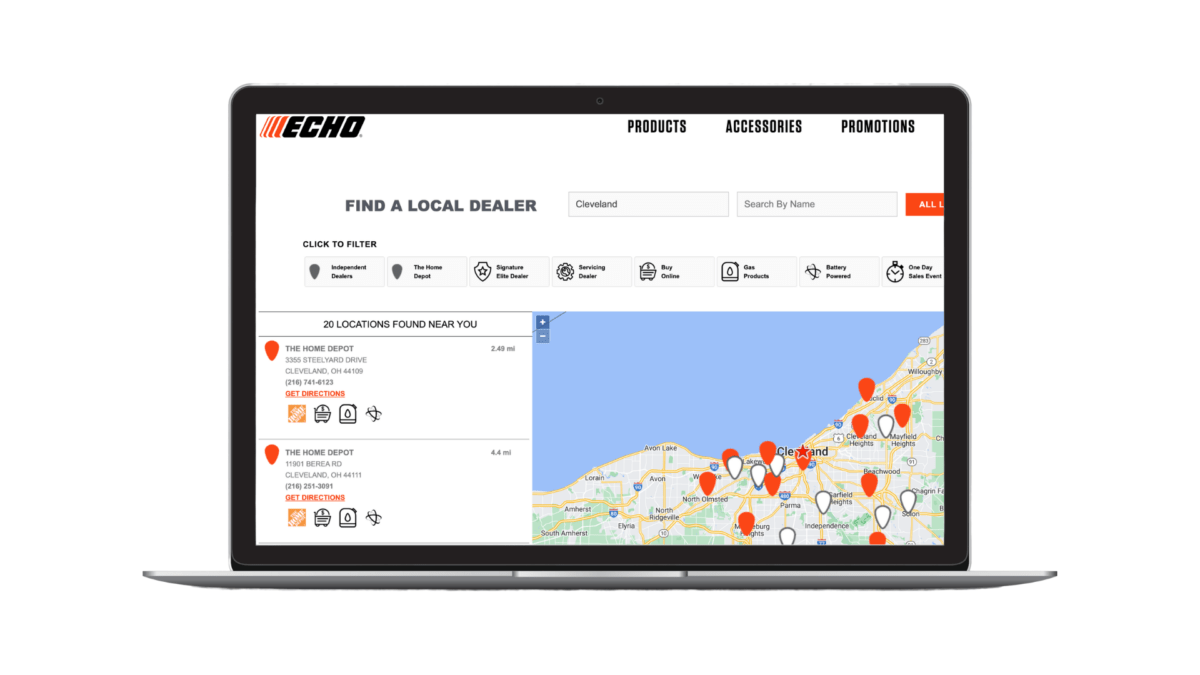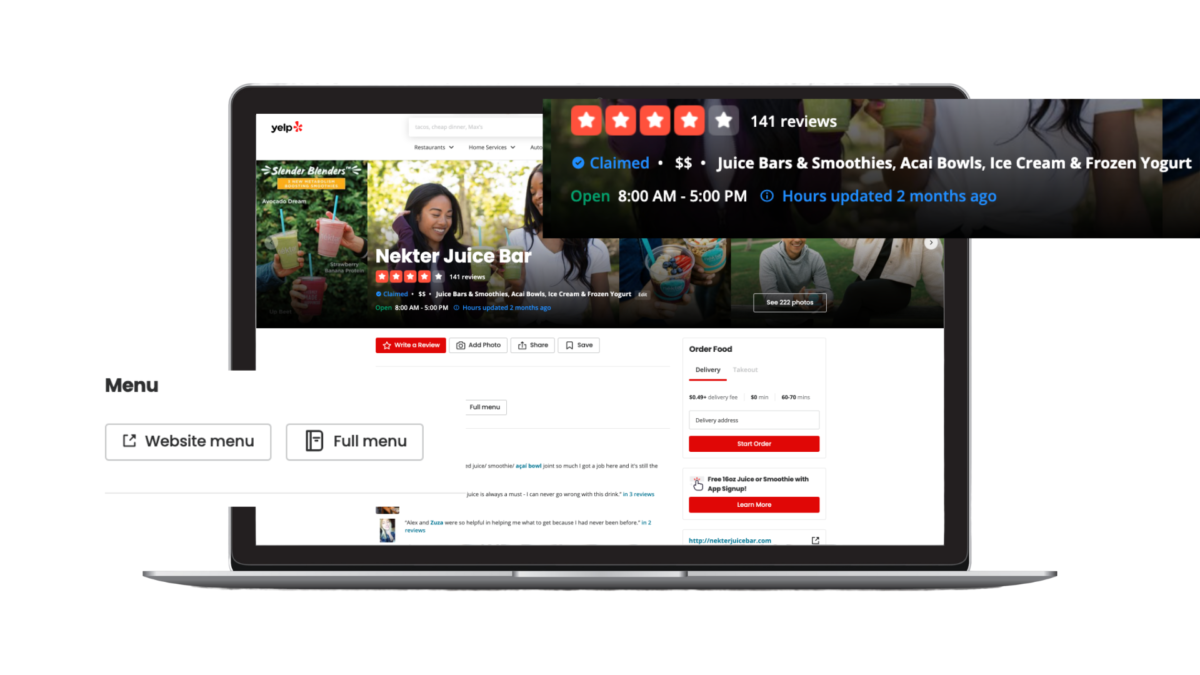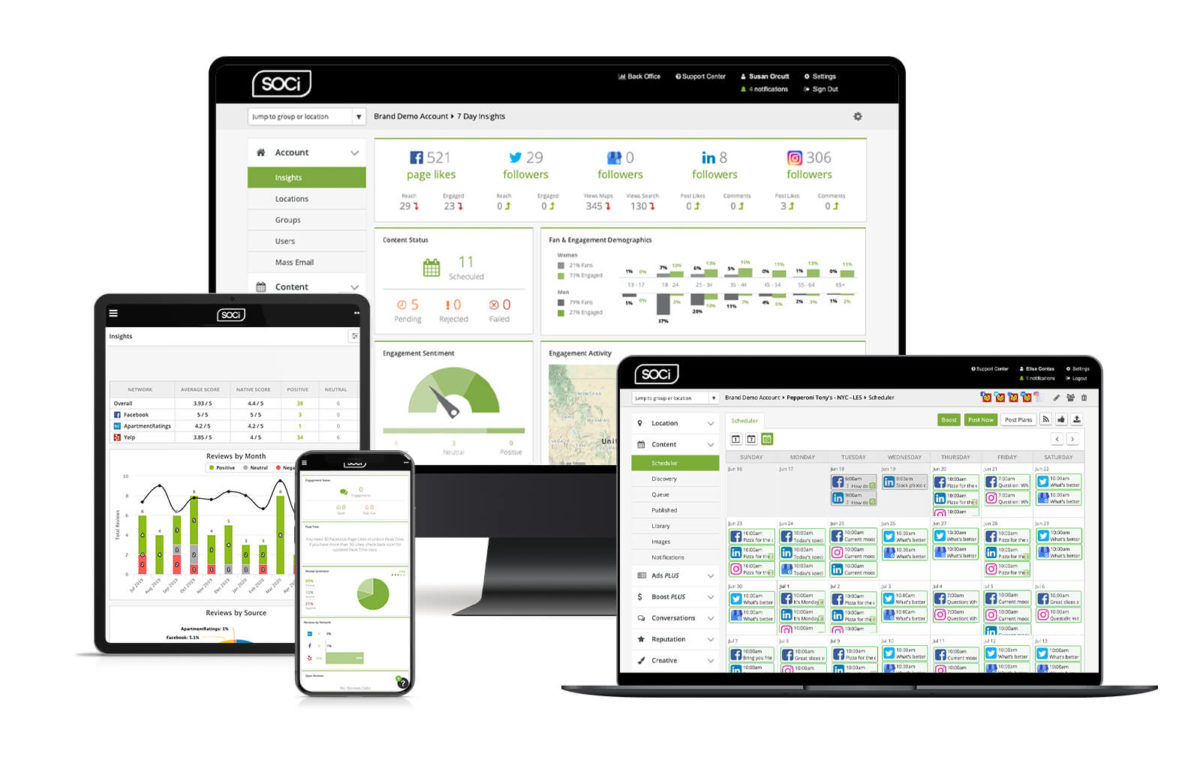Developing and Executing a Multi-Location Marketing Strategy
Consumers today want ease, which means they’re searching online for local businesses. Forty-six percent of all Google searches are linked to something local. If you’re a multi-location business with hundreds or thousands of locations across the U.S., it’s difficult to stand out online. You need to adopt a multi-location marketing strategy and mindset to meet consumers where they’re searching and win head-to-head battles against competitors.
Multi-location marketing is the act of targeting and marketing to consumers at the local level through various channels to drive online and in-person traffic and sales to each of your company’s locations.
Multi-location marketers also have the unique charge to uphold and improve the brand’s image through national and local marketing efforts. Multi-location marketing helps achieve this obstacle.
In this blog post, we’ll discuss the three main components of multi-location marketing — local search, local social, and online reputation management — and how they work symbiotically together to boost your multi-location business’s profit.
Local Search
Table of Contents
The importance of local search is non-negotiable. In fact, 75 percent of searchers never scroll past page one of the search engine results page (SERP). If your multi-location business isn’t visible in local searches, you’re missing out.
When we say local search, we often refer to local SEO (search engine optimization). Local search is when businesses optimize their website, local listings, and local pages to appear in consumers’ search results when they look up relevant products or services.
With local search marketing, you should focus on optimizing three areas:
- Local (landing) pages
- Local listings
- Your website’s locator
We’ll explain in more detail below how these three elements play into your multi-location marketing strategy.
Local Pages
Local pages, also known as local landing pages, are web pages specific to one business location. As a multi-location business, you need a local page for each business location or franchise. Local pages help to highligh unique and local features and offerings, making it more relevant to a given community.
Local landing pages will often feature specific information about the location that consumers are searching for, such as:
- Location’s name
- Address
- Phone number
- Hours of operation
- Map and directions
- Products and services
- Online ordering
It’s essential to not only have these local pages but to ensure they’re up-to-date with accurate information. Inaccurate information can cause confusion and potentially build distrust between consumers and your local business and brand.
Read our blog post on creating killer local landing pages for more detailed information on optimizing them.
Store Locators
Store locators go hand-in-hand with local pages. A store locator, sometimes called a locator for short, is a web page or part of your mobile app that includes all of your brand’s stores or local dealers that sell your products or services.
Store locators can drastically improve your customer experience. Similar to local pages, they give website visitors information and unique details about each store, such as:
- Map and directions
- Hours of operations
- Special promotions
- Local events
Store locators also improve your customer journey by cutting down on unnecessary telephone calls and reducing visits during closed hours. They also move online consumers quicker through the purchasing process with ratings and reviews for specific stores, real-time updates, and product and location filtering capabilities.
Local Listings
Local listings are an online mention of a business’s name, address, and phone number (NAP) and often include a link to your website. Local listings are found on local directories such as Google, Yelp, Apple, Bing, and others.
Think of local listings this way: When someone searches for “restaurants” on Google Search or Maps, or a listings platform like Yelp, you want your local businesses’ listing to appear. Here’s an example of a local listing on Yelp.
Like local pages, you want accurate business information across your local listings. Here’s a list of local listing management tips you must do to optimize your listings and improve your multi-location marketing:
- Claim all of your local listings on all major search engines and directories
- Businesses in the Google 3-Pack receive 126 percent more traffic than businesses ranked 4-10. You must claim your Google Business Profile (GBP) to rank.
- Include accurate business information such as the location name, address, and phone number (NAP)
- 76 percent of all local smartphone searches led to an in-store visit within 24 hours. You need accurate store information.
- Upload high-quality photos of each business location, your products, and services
- 44 percent of local results contain a featured photo in the summary listing.
- Add relevant calls-to-action (CTAs) such as “Book an Appointment” or “Start an Online Order”
- The average click-through-rate (CTR) for a CTA is 4.23 percent across all industries — with buttons having the highest CTR at 5.31 percent.
- Respond to reviews on your local listings
- 97 percent of consumers who regularly read reviews pay attention to the responses from business owners and operators.
For more details on how to improve your local listings, read our Ultimate Guide to Optimizing Your Local Listings article.
Local Social
Now that we’ve covered the basics of local search, let’s dive into local social. Local social, also known as local social media, is when you create local social media profiles and develop and share content for your local community and audiences.
When scrolling through social media, are you more likely to stop for a local or national post from a business? The data says local.
Our research found that localized content receives 12x the engagement rate of more general or “non-localized content.” Moreover, three out of four brand engagements happen on Facebook, Google Business Profile, and other platforms’ local pages versus national pages.
Improve Your Localized Social Content With Local Social Pages
To have a comprehensive local social media presence, your multi-location business should be on Facebook, Instagram, Twitter, and, for business purposes, LinkedIn. On Facebook especially, you need to have local social profiles — individual social media profiles for each business location.
On these local social profiles, posting localized content is a must. Here are a few ways you can take your local social efforts to the next level:
- Post about partnerships and events with other local businesses, nonprofits, or charity organizations
- Highlight or shout out employees
- Promote special discounts, promotions, or upcoming events
- Post short videos, which have twice the correlation with engagement as posts with only photos
- Share new product releases or services
If you sell products online directly to consumers, consider having Facebook and Instagram Shops connected to your local social pages. These shops allow your target audience to buy directly from you without leaving the platform.
Additionally, local social profiles help multi-location marketers with SEO and the buyer’s journey. More and more online users are turning to social media to find information about local businesses.
If you’re not on these social media platforms, you’re likely losing potential customers to competitors, especially younger generations. According to Forbes, 35 percent of consumers and nearly half of Gen Z and millennials prefer to purchase from a brand on social media rather than the brand’s website.
For more detailed information on improving your localized social media strategy, download our Localized Social Content Guide today!
Online Reputation Management
The final aspect of a multi-location marketing strategy is online reputation management (ORM) or brand reputation management. There are two main categories of ORM, social listening and review response. Let’s discuss social listening first.
Social Listening
Social listening is the continual act of listening to and analyzing conversations and trends around your brand, competitors, and industry. Social listening is difficult to achieve without the right social listening software, which we’ll get to later.
For now, know that social listening means keeping your ear to where consumers are discussing your multi-location business, including, but not limited to the following:
- Review sites
- Local listings
- Social media platforms (Twitter and Facebook in particular)
- YouTube
- Local and national news outlets
While social listening is important, your business must take action on the feedback and data you receive. If done correctly, social listening can help you collect consumer insight, stay up-to-date on competitors in your industry, respond to reviews, and help better define your content strategy. Now onto review response!
Review Response
Responding to reviews is a critical aspect of ORM. Multi-location marketers face the distinct challenge of monitoring and responding to reviews across 1,00s or 1,000s of locations on multiple listings, directories, and social media platforms.
You might be wondering if it’s even worth responding to these reviews. Yes, and the data proves it.
- In 2022, seventy-seven percent of consumers either “always” or “regularly” read online reviews when researching a local business.
- Forty percent of consumers who’ve posted a negative review expect a response from the company in under 24 hours.
- Approximately 80 percent of millennials expect brands to respond to comments on social media.
- On average, multi-location businesses in the U.S. respond to local Google reviews 36.2 percent of the time and 28.3 percent of the time to Facebook reviews.
It’s apparent that consumers who leave reviews, particularly negative ones, expect a response, and most multi-location businesses aren’t meeting these expectations. This lack of response leaves an opportunity for your company and brand to shine with a well-organized and structured review response system.
Here are a few tips for multi-location marketers to improve their review response:
- Respond to the most recent reviews first, especially negative ones
- Include personalization and vary your responses so they’re not robotic and ingenuine
- Don’t be afraid to acknowledge and report possible fake or spammy reviews
- Adhere to brand and style guidelines when responding to reviews
For an in-depth manual on review response and ORM, download our Online Reputation Management Guide For Multi-Location Marketers.
Choosing a Centralized Multi-Location Marketing Platform
To recap, there are three main elements of multi-location marketing: local search, local social, and online reputation management. You can manage and improve each of these categories through these features:
- Local search
- Local pages
- Store locators
- Local listings
- Local Social
- Local social profiles
- Online Reputation Management
- Social listening
- Review response
The best way to quickly and effectively improve your multi-location marketing is to use an all-in-one solution like SOCi. SOCi is built for multi-location marketers and has already helped over 600 multi-location businesses operate and enhance their multi-location marketing strategy.
For instance, SOCi Local Pages and Locator and SOCi Listings can help improve your local SEO and drive traffic to your stores. SOCi’s social media management system makes it easy to create, manage, and analyze social campaigns across 100s or 1,000s of local social profiles.
Lastly, SOCi Reviews, enables you to monitor, respond, and analyze sentiments across your business locations and stores.
The best part is that SOCi offers all of these solutions under a single login and can be scaled across 100s to 1,000s of business locations! It’s time to level up your multi-location marketing efforts, and SOCi is here to help.
For more information on our products or services, request a demo today!







